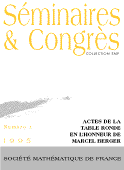 Séminaires et Congrès - 2 - pages 185-219 | |
|

| |  |
Algèbre non commutative, groupes quantiques et invariants Septième contact Franco-Belge, Reims, Juin 1995
J. Alev, G. Cauchon (Éd.)
Séminaires et Congrès 2 (1997), 304 pages
Coxeter Structure and Finite Group Action
Anthony JOSEPH
Séminaires et Congrès 2 (1997), 185-219
Download :
PS file
/
PDF file
Résumé :
Let U( g) be the enveloping algebra of a semi-simple Lie algebra g. Very little is known about the nature of ![]() . However, if G is a finite subgroup of
. However, if G is a finite subgroup of ![]() then very general results of Lorenz-Passman and of Montgomery can be used to relate
then very general results of Lorenz-Passman and of Montgomery can be used to relate ![]() to
to ![]() . As noted by Alev-Polo one may read off the Dynkin diagram of g from
. As noted by Alev-Polo one may read off the Dynkin diagram of g from ![]() and they used this to show that U( g)G could not be again the enveloping algebra of a semi-simple Lie algebra unless G is trivial. Again let U be the minimal primitive quotient of U( g) admitting the trivial representation of g. A theorem of Polo asserts that if UG is isomorphic to a similarly defined quotient of U( g'): g' semi-simple, then
and they used this to show that U( g)G could not be again the enveloping algebra of a semi-simple Lie algebra unless G is trivial. Again let U be the minimal primitive quotient of U( g) admitting the trivial representation of g. A theorem of Polo asserts that if UG is isomorphic to a similarly defined quotient of U( g'): g' semi-simple, then ![]() . However in this case one cannot say that G is trivial.
. However in this case one cannot say that G is trivial.
The main content of this paper is the possible generalization of Polo's theorem to other minimal primitive quotients. A very significant technical difficulty arises from the Goldie rank of the almost minimal primitive quotients being >1. Even under relatively strong hypotheses (regularity and integrality of the central character) one is only able to say that the Coxeter diagrams of g and g' coincide. The main thrust of the proofs is a systematic use of the Lorenz-Passman-Montgomery theory and the known very detailed description of ![]() . Unfortunately there is a severe lack of good examples. During this work some purely ring theoretic results involving Goldie rank comparisons and skew-field extensions are presented. A new inequality for Gelfand-Kirillov dimension is obtained and this leads to an interesting question involving a possible application of the intersection theorem.
. Unfortunately there is a severe lack of good examples. During this work some purely ring theoretic results involving Goldie rank comparisons and skew-field extensions are presented. A new inequality for Gelfand-Kirillov dimension is obtained and this leads to an interesting question involving a possible application of the intersection theorem.
Class. math. : 20G05, 14L30, 20C30